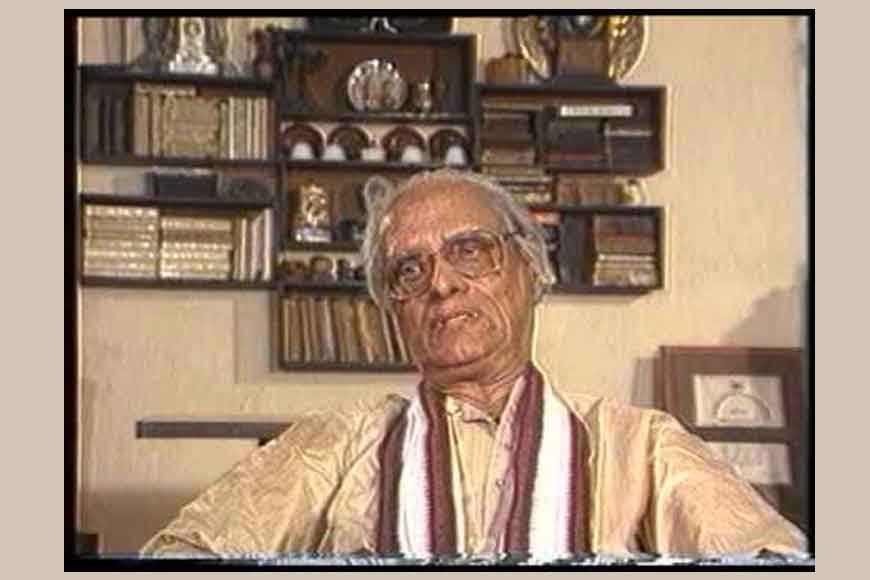Pathe Prabashe is not a mere travelogue

‘What is great in the realm of art might not be equally acceptable in the realm of morality; similarly, what morality finds laudable might fail to satisfy artistic thirst’ – this observation, articulated in the course of Annada Shankar Ray’s essay collection on Tolstoy, reflects on Roy’s philosophy regarding art and literature. Distinguishing art from ethics and religion, he eventually rationalizes flaws and follies, that human life is essentially imbued with. As a keen observer, Roy, examines human life from multifarious angles and celebrates the laughter and grief, wholeness and holes of humanity side by side. Pathe Prabase, a travelogue and autobiography by Annada Shankar Ray, accumulates such observations, which particularly delineates European life, but which in depth contemplates on diverse fluxes of life.
Annada Shankar Ray patronizes the idea, that alongside imagination, littérateurs cannot ignore her/his responsibility of representing their own time. But transformation of time and reality into art should not anyhow hamper the artistic spontaneity that he repeatedly emphasizes on. He has a brilliant capacity to maintain both beauty and substantiality in his writing. Most praiseworthy is his contributions to poems. Ray depicts the social, political or ideological crises of his contemporary India in a prolific, simple and catchy language through many of his writings. But in doing so his consciousness regarding the world outside India does not slack; rather he has been able to formulate a ‘world-view’ more harmoniously through scrupulous inspection of India. Pathe Prabase, therefore, adopts a reverse method; Ray sees India through the eye of Europe and adds a new dimension to his understandings about India and the world outside, sophisticates his knowledge regarding cultural diversity and develops an idiosyncratic stand about the progress of the world.
Ray wrote this travelogue during his travel through Europe, between 1926-29. Pramatha Chaudhuri, in the introduction, appreciates the youthfulness of this book as Ray has not borrowed any eye from the external theories or values to see Europe. His unshrouded mind discovers Europe gradually and searches for the bridges as well as breaches that India can develop for improving her relations with Europe. Ray travels to different countries of Europe and, as he mentions in the book, digs out new treasures of experiences and wisdom. A new country, the author thinks, not only opens new sights, but also helps one shake off narrowness.
When he sees London for the first time, what he finds is a sunless and solitary city. However, architecture and cleanliness of the city satisfy him. ‘People of London speak little’ – it amazes the author because Indian people never hesitate to ask even about one’s salary, no matter he is shortly acquainted or for long. This single difference widens the gap between the societies of the East and the West in the author's eye as it questions the depth of intimacy and socialization. The author discovers a hardworking and utilitarian England with equal participation of men and women in every sector. People are given adequate freedom to cultivate individualism, instead of being restricted with social or religious norms. Such a disciplined nation however is not bereft of the pleasure of life because they believe in celebrations – they celebrate life through dancing, drinking, and traveling – and in this grand arrangement, people, irrespective of class, gender or religion, play parts. In France, Roy encounters a nation full of life. They spend hours in cafes, gossiping or unconsciously creating timeless arts. Roy smells an underlying connection between the cultures of France, Germany, Russia and Indian subcontinent in character; but he finds many of the practices of England distinct and praiseworthy. From toothbrush to law, people of England earn their rights and act proportionately for the preservation of those.
While Ray was writing this travelogue, Indian subcontinent was under the colonial rule of England and the world was getting ready for another great war. Amidst such turmoil Ray recommends peace through the interchange of cultural practices between England and India. He dreams of a borderless world where truths of one culture would strengthen the base of another. Therefore, Pathe Prabase transcends the boundary of a mere travelogue, but becomes a collection of views regarding the world where humanity glues one corner to another.
(Taken from a review of Pathe Prabashe by Barna Talukdar)










